Poem In Your Pocket Day 2023
Poem in Your Pocket Day is an international movement that encourages people to centre poetry within their daily interactions.
On PIYP Day, select a poem, carry it with you, and share it with others at schools, bookstores, libraries, parks, workplaces, coffee shops, street corners, and on social media using the hashtag #PocketPoem.
The 2023 Poem in Your Pocket Day Postcard collection is here!
This year’s Poem In Your Pocket Collection features poetry by: George Amabile, Manahil Bandukwala, Rae Crossman, Jannie Edwards, Y S Lee, Kyo Lee, D.A. Lockhart, Briana Lu, Anthony Purdy, Sneha Madhavan-Reese, Richard-Yves Sitoski, Michael V. Smith, Eleonore Schönmaier and Pujita Verma.
Read their poems below and share with others.
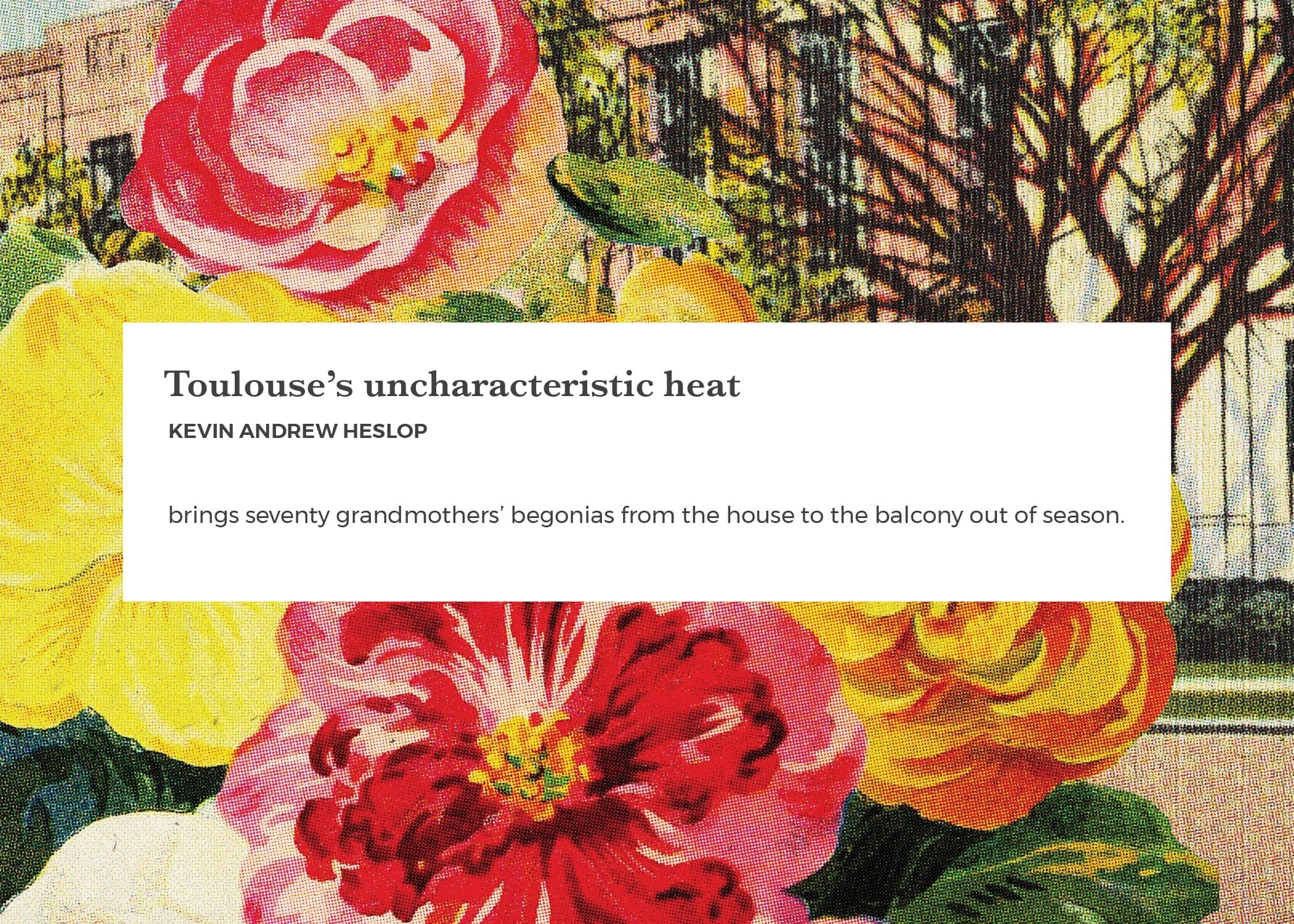
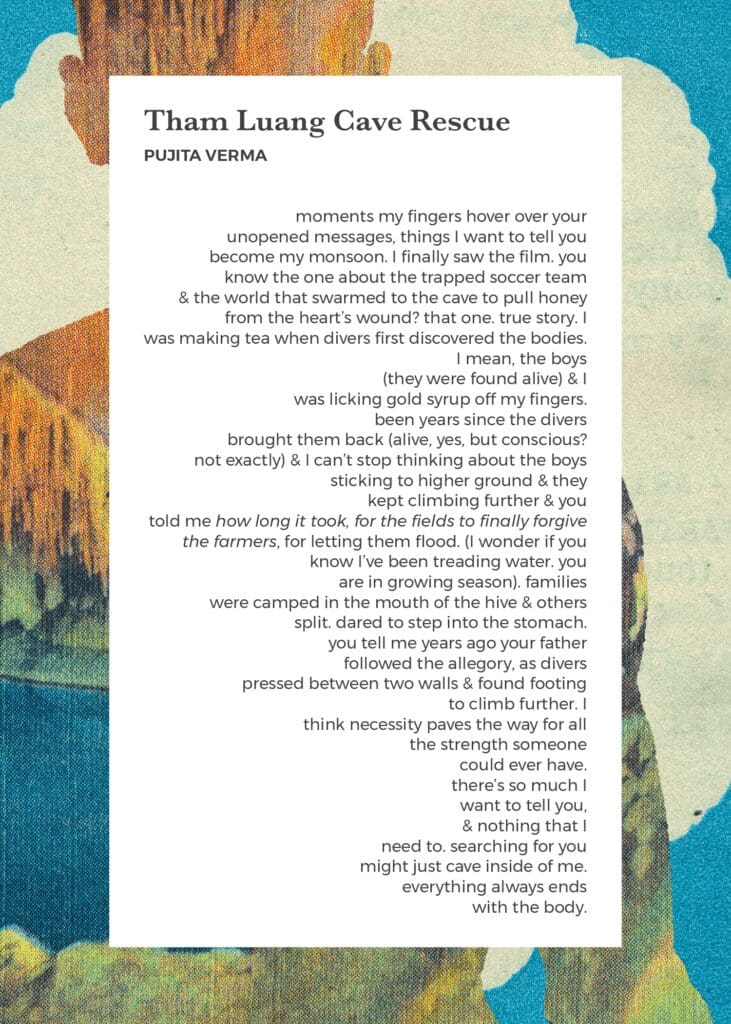
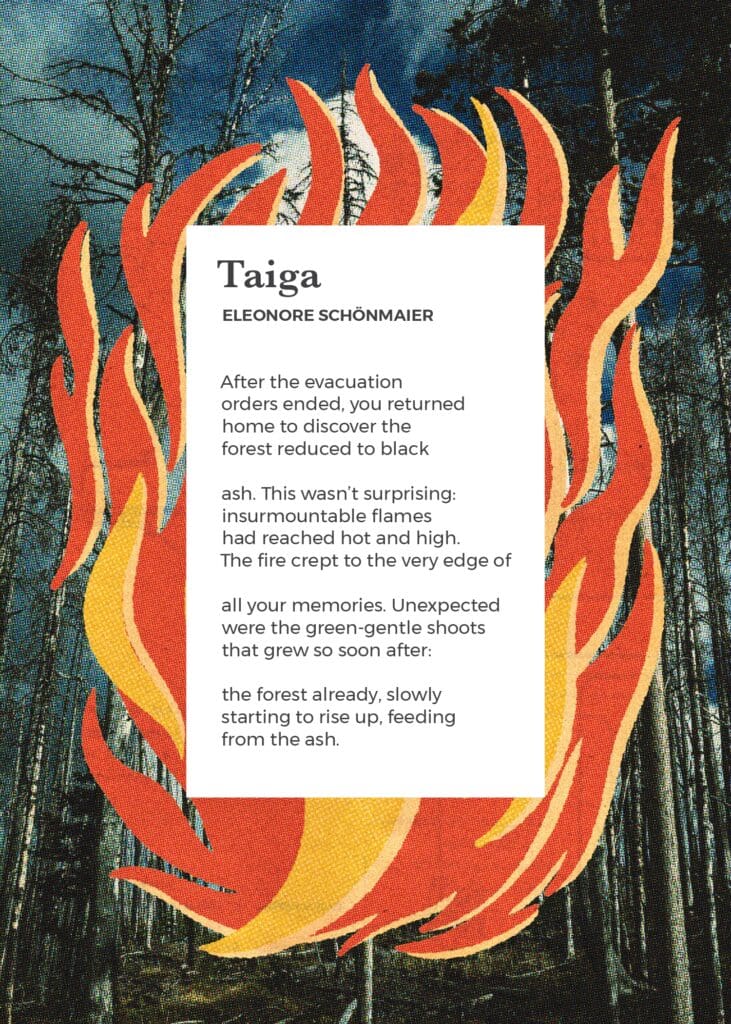


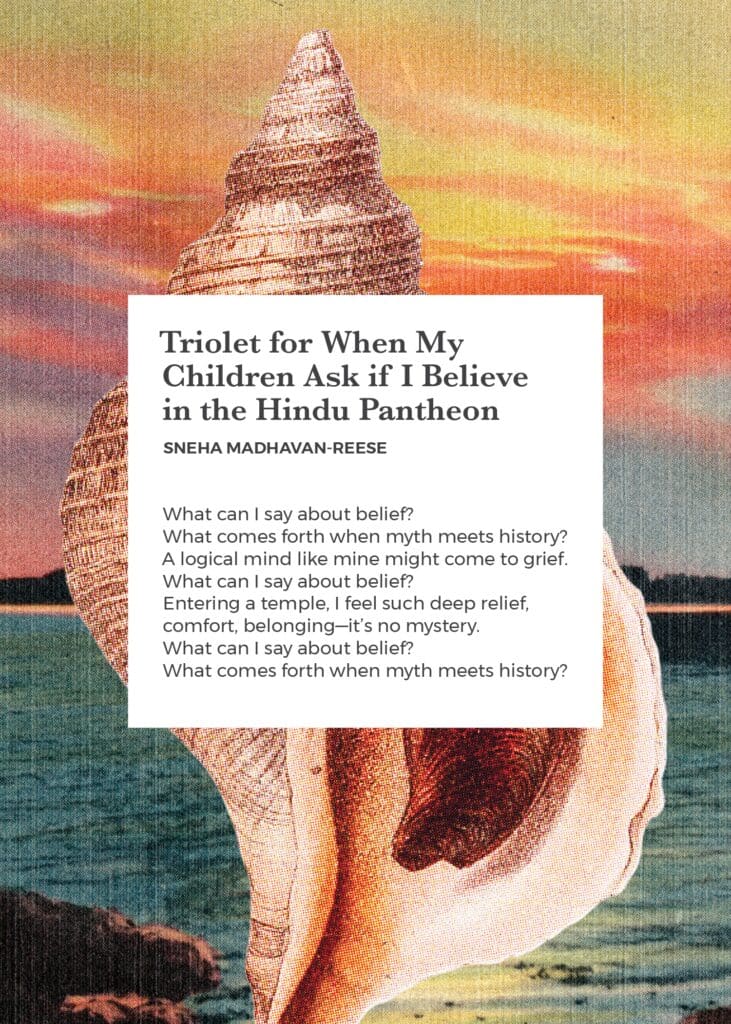

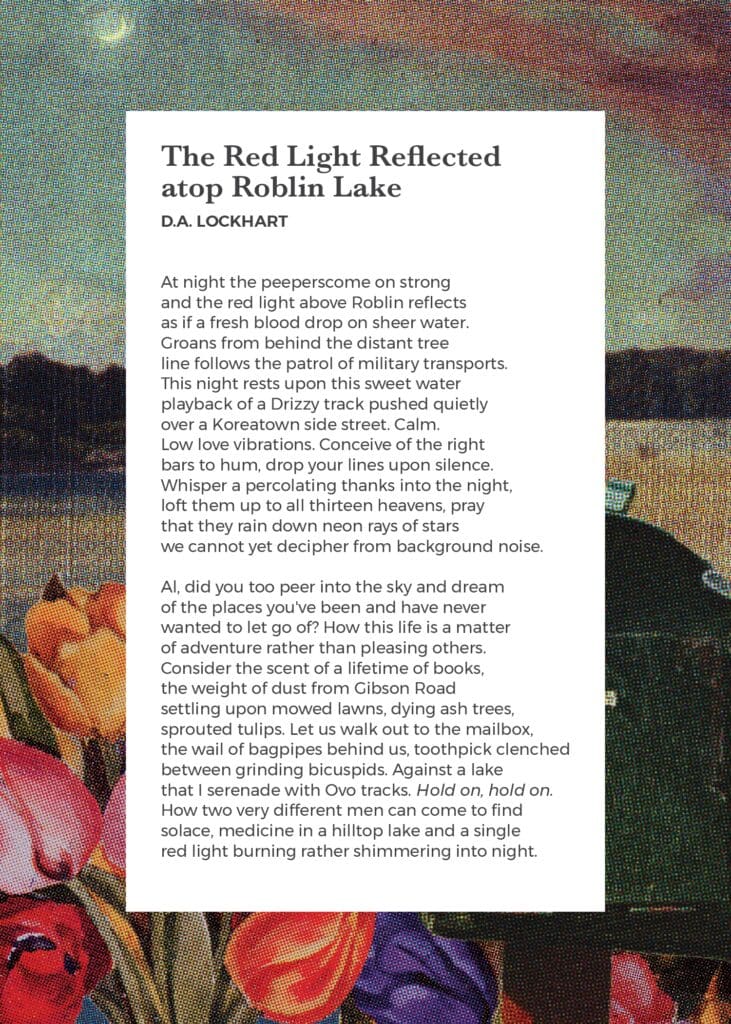
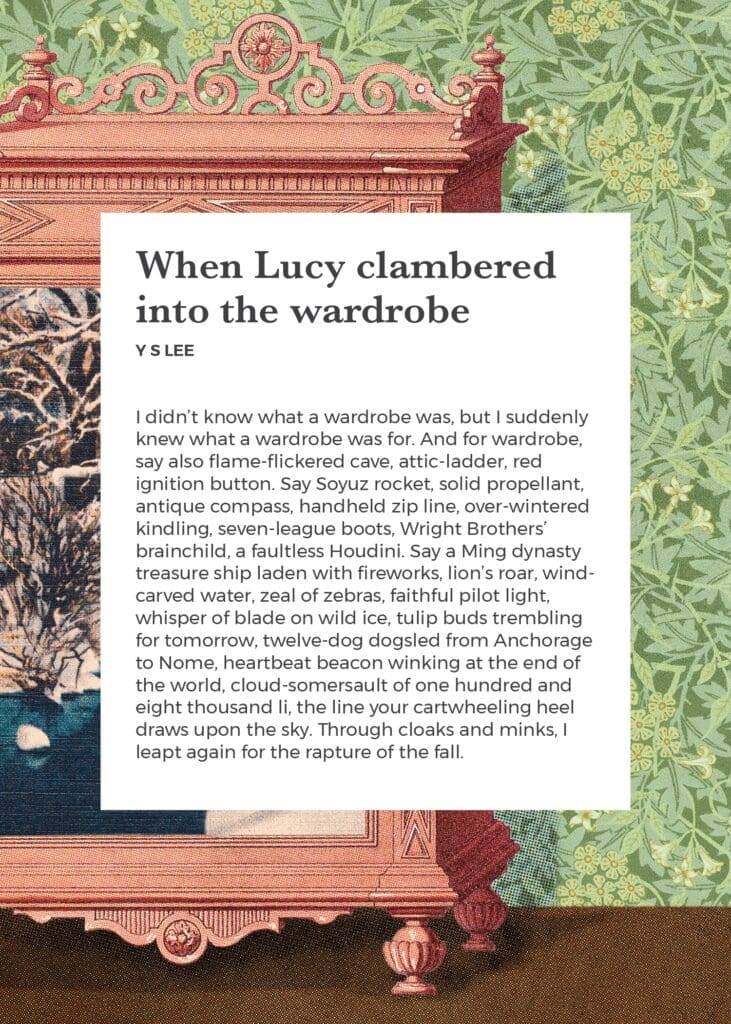
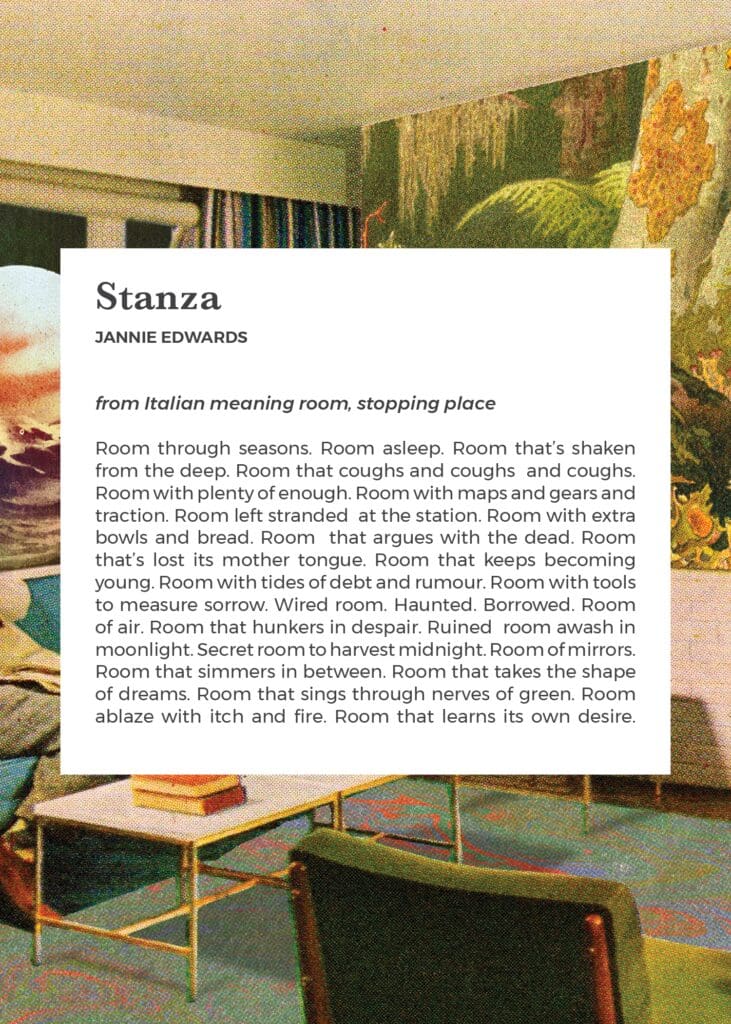
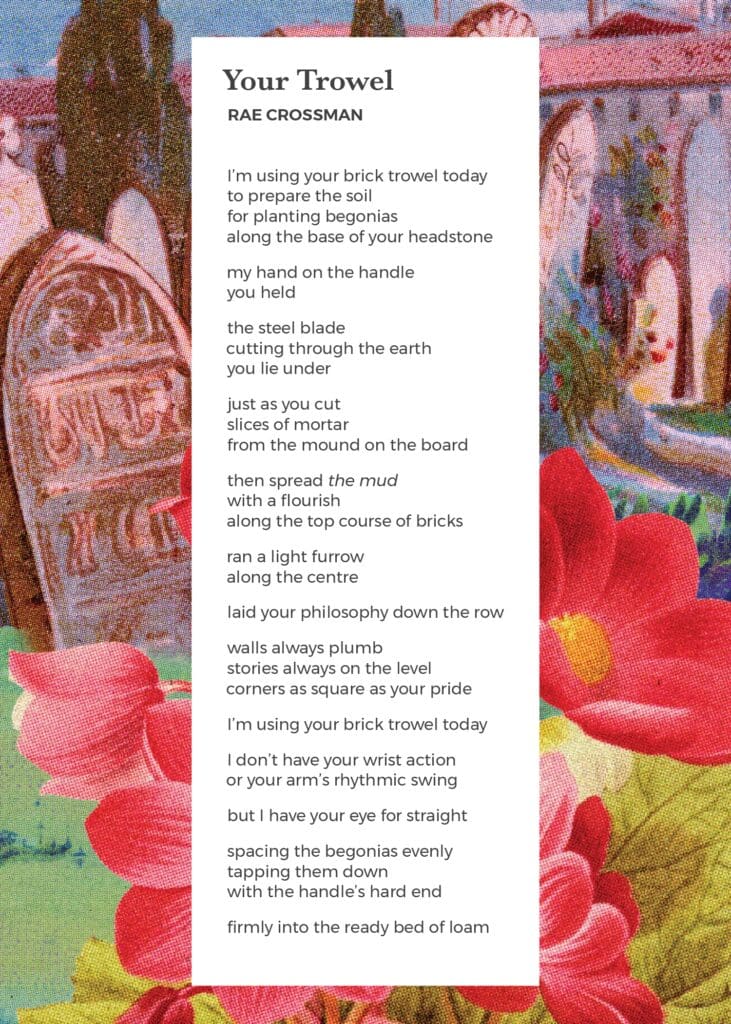
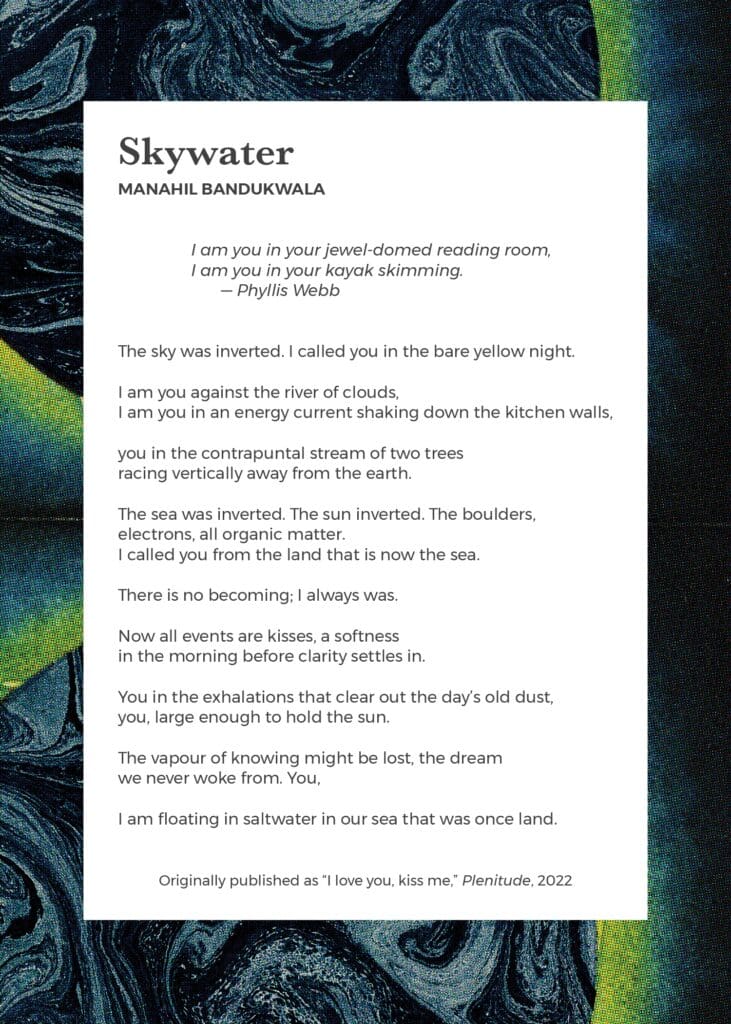
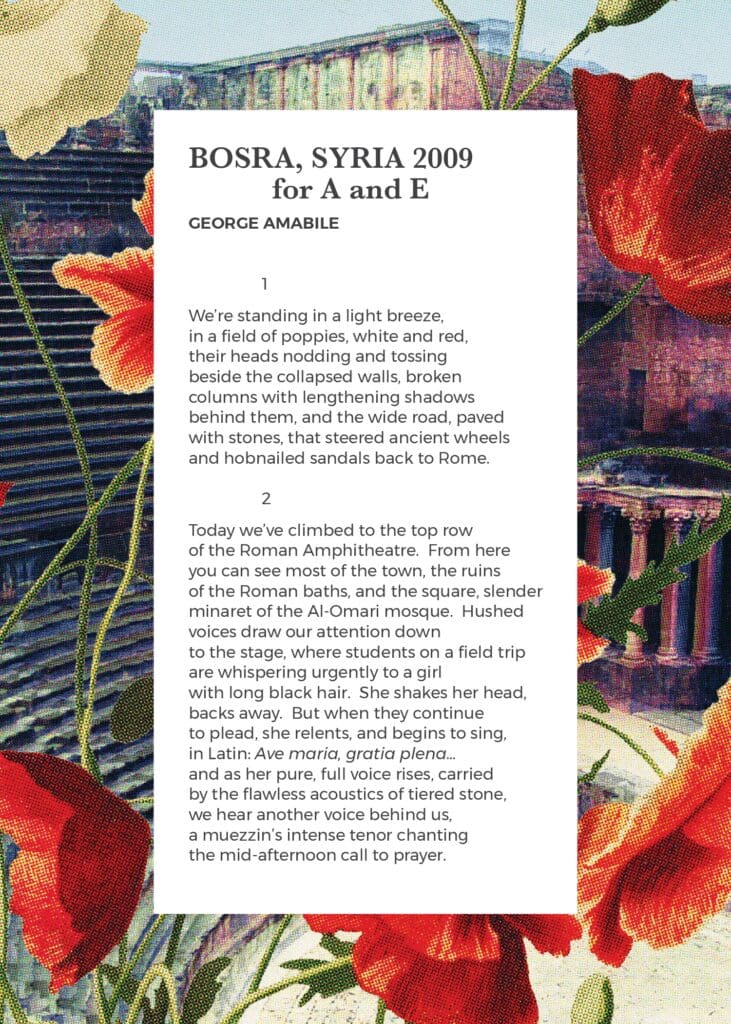
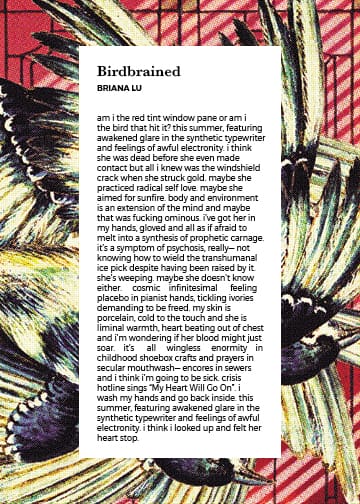
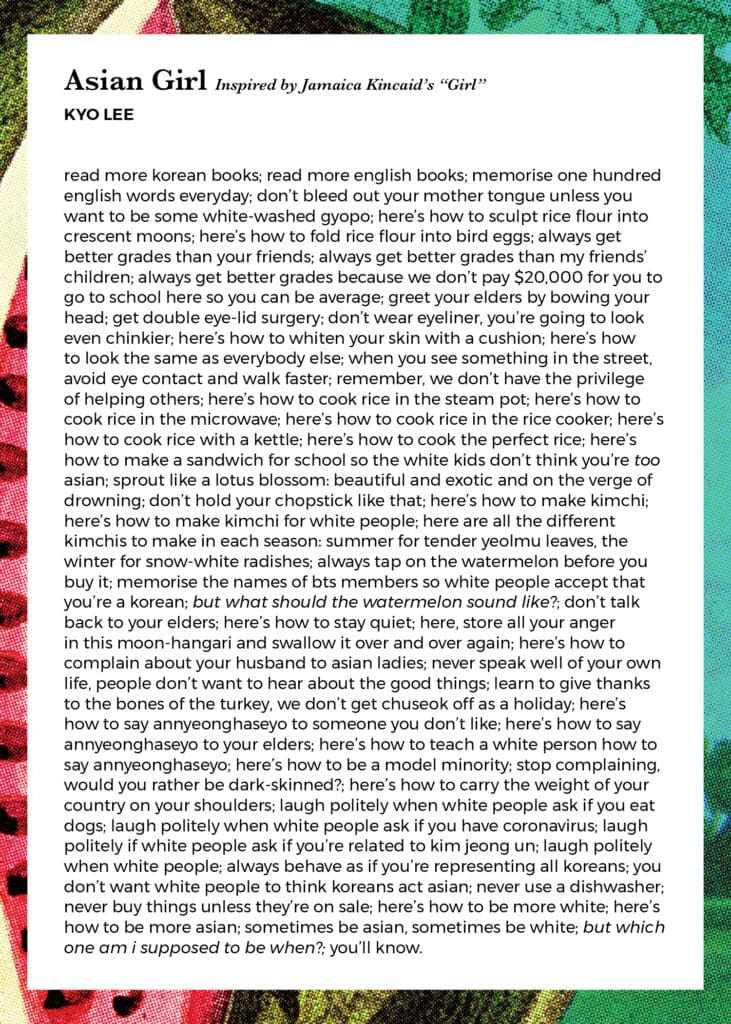
BOSRA, SYRIA 2009
for A and E
George Amabile
1
We’re standing in a light breeze,
in a field of poppies, white and red,
their heads nodding and tossing
beside the collapsed walls, broken
columns with lengthening shadows
behind them, and the wide road, paved
with stones, that steered ancient wheels
and hobnailed sandals back to Rome.
2
Today we’ve climbed to the top row
of the Roman Amphitheatre. From here
you can see most of the town, the ruins
of the Roman baths, and the square, slender
minaret of the Al-Omari mosque. Hushed
voices draw our attention down
to the stage, where students on a field trip
are whispering urgently to a girl
with long black hair. She shakes her head,
backs away. But when they continue
to plead, she relents, and begins to sing,
in Latin: Ave maria, gratia plena…
and as her pure, full voice rises, carried
by the flawless acoustics of tiered stone,
we hear another voice behind us,
a muezzin’s intense tenor chanting
the mid-afternoon call to prayer.
George Amabile has published twelve books and has had work in over a hundred national and international venues, including The New Yorker, Poetry (Chicago), American Poetry Review, Botteghe Oscure, The Globe and Mail, The Penguin Book of Canadian Verse, Saturday Night, Poetry Australia, Sur (Buenos Aires), Poetry Canada Review, and Canadian Literature. His most recent publications are a long poem, Dancing, with Mirrors (Porcupine’s Quill, 2011), Small Change (Fiction, Libros Libertad, 2011) and Martial Music (poetry, Signature Editions, 2016) all of which have won the prestigious Bressani Award, and an International Crime novel, Operation Stealth Seed (Signature Editions, 2019) which won the Michael von Rooy Award for Genre Fiction.
—–
Skywater
Manahil Bandukwala
I am you in your jewel-domed reading room,
I am you in your kayak skimming.
— Phyllis Webb
The sky was inverted. I called you in the bare yellow night.
I am you against the river of clouds,
I am you in an energy current shaking down the kitchen walls,
you in the contrapuntal stream of two trees
racing vertically away from the earth.
The sea was inverted. The sun inverted. The boulders,
electrons, all organic matter.
I called you from the land that is now the sea.
There is no becoming; I always was.
Now all events are kisses, a softness
in the morning before clarity settles in.
You in the exhalations that clear out the day’s old dust,
you, large enough to hold the sun.
The vapour of knowing might be lost, the dream
we never woke from. You,
I am floating in saltwater in our sea that was once land.
Originally published as “I love you, kiss me,” Plenitude, 2022
Manahil Bandukwala is a writer and visual artist originally from Pakistan and now settled in Canada. In 2021, she was shortlisted for the bpNichol Chapbook Award. She works as Coordinating Editor for Arc Poetry Magazine, and is Digital Content Editor for Canthius. She is a member of Ottawa-based collaborative writing group VII. Her project Reth aur Reghistan is a multidisciplinary exploration of folklore from Pakistan interpreted through poetry and sculpture. She holds an MA in English from the University of Waterloo. Her debut poetry collection is MONUMENT (Brick Books). See her work at manahilbandukwala.com
—–
Your Trowel
Rae Crossman
I’m using your brick trowel today
to prepare the soil
for planting begonias
along the base of your headstone
my hand on the handle
you held
the steel blade
cutting through the earth
you lie under
just as you cut
slices of mortar
from the mound on the board
then spread the mud
with a flourish
along the top course of bricks
ran a light furrow
along the centre
laid your philosophy down the row
walls always plumb
stories always on the level
corners as square as your pride
I’m using your brick trowel today
I don’t have your wrist action
or your arm’s rhythmic swing
but I have your eye for straight
spacing the begonias evenly
tapping them down
with the handle’s hard end
firmly into the ready bed of loam
Living on the Haldimand Tract in Kitchener, Ontario, Rae Crossman writes poetry both for the page and for oral performance. He has published poems in literary magazines and dramatized them on theatre stages, in classrooms, and around campfires on canoe trips. Working with dancers, musicians, and visual artists, he is particularly interested in the collaborative process of creativity. Joint projects include storytelling, choral compositions, and theatrical pieces set in natural environments.
—–
Stanza
Jannie Edwards
from Italian meaning room, stopping place
Room through seasons. Room asleep. Room that’s shaken
from the deep. Room that coughs and coughs and coughs.
Room with plenty of enough. Room with maps and gears and
traction. Room left stranded at the station. Room with extra
bowls and bread. Room that argues with the dead. Room
that’s lost its mother tongue. Room that keeps becoming
young. Room with tides of debt and rumour. Room with tools
to measure sorrow. Wired room. Haunted. Borrowed. Room
of air. Room that hunkers in despair. Ruined room awash in
moonlight. Secret room to harvest midnight. Room of mirrors.
Room that simmers in between. Room that takes the shape
of dreams. Room that sings through nerves of green. Room
ablaze with itch and fire. Room that learns its own desire.
Jannie Edwards is a writer, editor and teacher who lives in Amiskwacîwâskahikan/ Edmonton on Treaty 6 / Métis Region #4 lands. Her most recent collaboration is the chapbook Learning Their Names: Letters from the Home Place (Collusion Books) with visual artist Sydney Lancaster
—–
When Lucy clambered into the wardrobe
Y S Lee
I didn’t know what a wardrobe was, but I suddenly
knew what a wardrobe was for. And for wardrobe,
say also flame-flickered cave, attic-ladder, red
ignition button. Say Soyuz rocket, solid propellant,
antique compass, handheld zip line, over-wintered
kindling, seven-league boots, Wright Brothers’
brainchild, a faultless Houdini. Say a Ming dynasty
treasure ship laden with fireworks, lion’s roar, wind-
carved water, zeal of zebras, faithful pilot light,
whisper of blade on wild ice, tulip buds trembling
for tomorrow, twelve-dog dogsled from Anchorage
to Nome, heartbeat beacon winking at the end of
the world, cloud-somersault of one hundred and
eight thousand li, the line your cartwheeling heel
draws upon the sky. Through cloaks and minks, I
leapt again for the rapture of the fall.
Y.S. Lee is the 2022 winner of CV2’s Foster Poetry Prize. Her work appears/is forthcoming in EVENT, The Malahat Review, Arc Poetry Magazine, The Literary Review of Canada, and other journals. A lyric essay, “Tek tek”, was shortlisted for the 2022 CBC Nonfiction Prize, and her fiction includes the award-winning YA
mystery series The Agency (Candlewick Press). She lives in a place we’re learning to call Katarokwi.
—–
The Red Light Reflected
atop Roblin Lake
D.A. Lockhart
At night the peeperscome on strong
and the red light above Roblin reflects
as if a fresh blood drop on sheer water.
Groans from behind the distant tree
line follows the patrol of military transports.
This night rests upon this sweet water
playback of a Drizzy track pushed quietly
over a Koreatown side street. Calm.
Low love vibrations. Conceive of the right
bars to hum, drop your lines upon silence.
Whisper a percolating thanks into the night,
loft them up to all thirteen heavens, pray
that they rain down neon rays of stars
we cannot yet decipher from background noise.
Al, did you too peer into the sky and dream
of the places you’ve been and have never
wanted to let go of? How this life is a matter
of adventure rather than pleasing others.
Consider the scent of a lifetime of books,
the weight of dust from Gibson Road
settling upon mowed lawns, dying ash trees,
sprouted tulips. Let us walk out to the mailbox,
the wail of bagpipes behind us, toothpick clenched
between grinding bicuspids. Against a lake
that I serenade with Ovo tracks. Hold on, hold on.
How two very different men can come to find
solace, medicine in a hilltop lake and a single
red light burning rather shimmering into night.
D.A. Lockhart is the author of multiple collections of poetry and short fiction. His work has been shortlisted for the Raymond Souster Award, the Indiana Author’s Award for Fiction, Relit Awards, and First Nations Communities READ Award. He is a graduate of the Indiana University – Bloomington MFA in Creative Writing program where he held a Neal-Marshall Graduate Fellowship in Creative Writing. He is pùkuwànkoamimëns (Turtle Clan) of the Moravian of the Thames First Nation. Lockhart currently resides at Waawiiyaatanong and Pelee Island where he is the publisher at Urban Farmhouse Press.
—–
Fiddleheads
Anthony Purdy
Beyond the willows, twilight stills the fields.
Deer sink from view to lie on flattened beds
of crabgrass, while we settle by candlelight
to fiddleheads steamed over rust-red water
and scallops simmered in an iron pan.
You lift the ferns clear of their peaty juice,
tip them in to join the scallops, finish
quickly with a knob of butter, then, with
shaking wrists, place the cast iron skillet
there between us on a blacksmith’s trivet.
We don’t need plates, you say, just bread and forks,
as you brandish yours in time to unheard
music, bowing wildly. I swing round, laughing,
to make it real on Spotify, then catch
myself – of course, we have no signal here.
The scroll, it’s true, is purely decorative
– it makes no sound – but when we listen to
the violin, some part of what we hear
is what we see; and when we eat the fern,
its tight-sprung fronds are music on our tongues.
Originally published in Fresh Voices, 2022
Anthony Purdy lives on Nova Scotia’s South Shore. His poems and stories can be found in recent issues of The Dalhousie Review, The Fiddlehead, FreeFall, Fresh Voices, The Goose, Grain, Poetry Pause, Prairie Fire, and Queen’s Quarterly. His story “Spoons” placed sec-ond in the 2022 Short Grain (Fiction) Contest.
—–
Triolet for When My
Children Ask if I Believe
in the Hindu Pantheon
Sneha Madhavan-Reese
What can I say about belief?
What comes forth when myth meets history?
A logical mind like mine might come to grief.
What can I say about belief?
Entering a temple, I feel such deep relief,
comfort, belonging—it’s no mystery.
What can I say about belief?
What comes forth when myth meets history?
Sneha Madhavan-Reese is the author of the poetry collections Observing the Moon (Hagios Press, 2015) and Elementary Particles (forthcoming from Brick Books, Fall 2023). Her writing has appeared in publications around the world, including The Best Canadian Poetry in English 2016. She lives with her family in Ottawa.
—–
Ischemic Stroke
Richard-Yves Sitoski
I have come to love
your beautiful confusions.
So tumble,
unroll yourself as a blanket on the grass.
Let meadow dew make sense
of imprecise precision.
And when you can’t talk, sing: imprint
your words on the twinkling leaves
and let them fall in the yellow of your gentleness.
I’ll rake them into lyrical piles,
then sew them to your nightdress
to rustle as you breathe,
to sound the stumbling darkness
and guide me,
sure-footed only in my sleep.
Richard-Yves Sitoski (he/him) is a songwriter, performance poet and the 2019-2023 Poet Laureate of Owen Sound, on the territory of the Saugeen Ojibway Nation. His work has appeared, or is forthcoming, in Arc, Prairie Fire, Train, The Fiddlehead, Bywords.ca, and elsewhere. 2021 John Newlove Award winner, 2022 Don Gutteridge Award winner (2nd place). His most recent works are No Sleep ‘til Eden (Ginger Press, 2020), an augmented reality collection of poems on the environment, and the chapbook How to Be Human (Bywords.ca, 2022). He is co-editor, with Penn Kemp, of Poems in Response to Peril: An Anthology in Support of Ukraine (Pendas Productions/Laughing Raven Press, 2021).
—–
Metaphor
Michael V. Smith
the cupped palm
of my grandfather
in the garden
teaching me
to curl my own
beneath the raspberry
and make my hand
a bowl
Michael V. Smith is writer, performer, and filmmaker living in Kelowna, BC. HIs most recent work is the feature film, The Floating Man, currently touring festivals around the world. Watch for his new poetry collection, Queers Like Me, out with Book*hug Press in Fall 2023. Michael teaches at UBC Okanagan.
—–
Taiga
Eleonore Schönmaier
After the evacuation
orders ended, you returned
home to discover the
forest reduced to
black ash. This wasn’t surprising:
insurmountable flames
had reached hot and high.
The fire crept to the very edge of
all your memories. Unexpected
were the green-gentle shoots
that grew so soon after:
the forest already, slowly
starting to rise up, feeding
from the ash.
Eleonore Schönmaier’s newest collection is Field Guide to the Lost Flower of Crete (McGill-Queen’s University Press, 2021). Wavelengths of Your Song (MQUP) was published in German translation as Wellenlängen deines Liedes (parasitenpresse, 2020). Dust Blown Side of the Journey (MQUP) was a finalist for the Eyelands Book Awards 2020 (Greece). Her poetry has been widely anthologized in the United States and Canada including in Best Canadian Poetry. Multiple international composers have set her poems to music. Born and raised in a northern wilderness settlement she witnessed multiple forest fires, and once her community was airlifted to safety. She’s a former northern nurse. eleonoreschonmaier.com
—–
Toulouse’s uncharacteristic heat
Kevin Andrew Heslop
brings seventy grandmothers’ begonias from the house to the balcony out of season.
Kevin Andrew Heslop is. Debut: the correct fury of your why is a mountain (Gordon Hill Press, Fall 2021). Lately:six feet | between us(McIntosh Gallery, Winter 2022); Revelations: Gathie Falk (Centred Magazine, Winter 2023). Forthcoming: in medias res (Westland Gallery, Spring 2023); mo(u)vements. (Astoria Pictures, Summer 2023); you are not required to complete the task; neither are you free to desist from it (Rose Garden Press, Spring 2024). Supported in part by the London Arts Council, Ontario Arts Council, and Canada Council for the Arts.
—–
birdbrained
by Briana Lu
am i the red tint window pane or am i the bird that hit it? this summer, featuring
awakened glare in the synthetic typewriter and feelings of awful electronity. i think
she was dead before she even made contact but all i knew was the windshield crack
when she struck gold. maybe she practiced radical self love. maybe she aimed for
sunfire. body and environment is an extension of the mind and maybe that was
fucking ominous. i’ve got her in my hands, gloved and all as if afraid to melt into
a synthesis of prophetic carnage. it’s a symptom of psychosis, really— not know-
ing how to wield the transhumanal ice pick despite having been raised by it. she’s
weeping. maybe she doesn’t know either. cosmic infinitesimal feeling placebo
in pianist hands, tickling ivories demanding to be freed. my skin is porcelain, cold to
the touch and she is liminal warmth, heart beating out of chest and i’m wondering if
her blood might just soar. it’s all wingless enormity in childhood shoebox crafts and
prayers in secular mouthwash— encores in sewers and i think i’m going to be sick.
crisis hotline sings “My Heart Will Go On”. i wash my hands and go back inside. this
summer, featuring awakened glare in the synthetic typewriter and feelings of awful
electronity. i think i looked up and felt her heart stop.
Briana Lu is the winner of the 2022 Jessamy Stursberg Poetry Prize for young poets, in the senior category for grades 10, 11, and 12.
—–
Asian Girl
By Kyo Lee
Inspired by Jamaica Kincaid’s “Girl”
read more korean books; read more english books; memorise one hundred english words every-
day; don’t bleed out your mother tongue unless you want to be some white-washed gyopo; here’s
how to sculpt rice flour into crescent moons; here’s how to fold rice flour into bird eggs; always get
better grades than your friends; always get better grades than my friends’ children; always get
better grades because we don’t pay $20,000 for you to go to school here so you can be average; greet
your elders by bowing your head; get double eye-lid surgery; don’t wear eyeliner, you’re going to
look even chinkier; here’s how to whiten your skin with a cushion; here’s how to look the same as
everybody else; when you see something in the street, avoid eye contact and walk faster; rem-
ember, we don’t have the privilege of helping others; here’s how to cook rice in the steam pot; here’s
how to cook rice in the microwave; here’s how to cook rice in the rice cooker; here’s how to cook
rice with a kettle; here’s how to cook the perfect rice; here’s how to make a sandwich for school so
the white kids don’t think you’re too asian; sprout like a lotus blossom: beautiful and exotic and on
the verge of drowning; don’t hold your chopstick like that; here’s how to make kimchi; here’s how to
make kimchi for white people; here are all the different kimchis to make in each season: summer for
tender yeolmu leaves, the winter for snow-white radishes; always tap on the watermelon before you
buy it; memorise the names of bts members so white people accept that you’re a korean; but what
should the watermelon sound like?; don’t talk back to your elders; here’s how to stay quiet; here,
store all your anger in this moon-hangari and swallow it over and over again; here’s how to complain
about your husband to asian ladies; never speak well of your own life, people don’t want to hear about the good things; learn to give thanks to the bones of the turkey, we don’t get chuseok off as a
holiday; here’s how to say annyeonghaseyo to someone you don’t like; here’s how to say annyeong
-haseyo to your elders; here’s how to teach a white person how to say annyeonghaseyo; here’s how
to be a model minority; stop complaining, would you rather be dark-skinned?; here’s how to carry
the weight of your country on your shoulders; laugh politely when white people ask if you eat dogs;
laugh politely when white people ask if you have coronavirus; laugh politely if white people ask if
you’re related to kim jeong un; laugh politely when white people; always behave as if you’re repre-
senting all koreans; you don’t want white people to think koreans act asian; never use a dishwasher;
never buy things unless they’re on sale; here’s how to be more white; here’s how to be more asian;
sometimes be asian, sometimes be white; but which one am i supposed to be when?; you’ll know.
Kyo Lee is the winner of the 2022 Jessamy Stursberg Poetry Prize for young poets, in the junior category for grades 7, 8, and 9.
—–
Tham Luang Cave Rescue
Pujita Verma
moments my fingers hover over your
unopened messages, things I want to tell you
become my monsoon. I finally saw the film. you
know the one about the trapped soccer team
& the world that swarmed to the cave to pull honey
from the heart’s wound? that one. true story. I
was making tea when divers first discovered the bodies.
I mean, the boys (they were found alive) & I
was licking gold syrup off my fingers.
been years since the divers
brought them back (alive, yes, but conscious?
not exactly) & I can’t stop thinking about the boys
sticking to higher ground & they
kept climbing further & you
told me how long it took, for the fields to finally forgive
the farmers, for letting them flood. (I wonder if you
know I’ve been treading water. you
are in growing season). families
were camped in the mouth of the hive & others
split. dared to step into the stomach.
you tell me years ago your father
followed the allegory, as divers
pressed between two walls & found footing
to climb further. I
think necessity paves the way for all
the strength someone
could ever have.
there’s so much I
want to tell you,
& nothing that I
need to. searching for you
might just cave inside of me.
everything always ends
with the body.
Winner of the 2022 Broadsheet Contest
Pujita Verma is an Indo-Canadian Poet & Illustrator. She was Mississauga’s Youth Poet Laureate (2018-2020), a Poetry In Voice National Finalist, and was recently longlisted for Palette Poetry’s Love & Eros Prize. Her work embraces themes of resilience and silence, culture and connection, memory, and matters of the heart. Pujita recently completed her BA in Political Science at Western University and works for the humanitarian organization War Child Canada.
